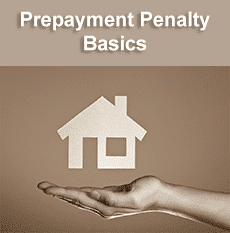 Fundamentally, a mortgage prepayment penalty is applied by lenders to recover some of the profit they would have made were the loan to have run its full term. Interest rates and other aspects of loans, including mortgages, are set on the basis of loans running for the agreed period, and should a borrower repay the loan sooner than that agreed period lenders will lose the interest they would have earned on the period still to run.
Fundamentally, a mortgage prepayment penalty is applied by lenders to recover some of the profit they would have made were the loan to have run its full term. Interest rates and other aspects of loans, including mortgages, are set on the basis of loans running for the agreed period, and should a borrower repay the loan sooner than that agreed period lenders will lose the interest they would have earned on the period still to run.
From the borrower’s perspective, it is best to repay the loan as soon as possible and so save on interest. However, were all borrowers to do this, lenders might lose much of the money they would have earned for the work they had carried out to arrange the loan. Income that would normally have been paid by the interest accrued over a period of time.
If not lose exactly, they would not make the expected income, and hence their own livelihood could be compromised. Lenders need some form of protection against early repayment if their income is dependent on interest payments. The alternative would be higher interest rates.
It should be made clear that such penalties are not allowed with Federal Housing Administration (FHA) loans, Rural Development (USDA) Loans and VA (Veteran Affairs) loans.
Variation Between States and Lenders
Mortgage prepayment penalties vary between states and lenders. There is no agreed national policy, although some states have laws in place whereby a prepayment penalty can only be applied to second mortgages on residential properties and on liens on properties purchased for investment.
They cannot be applied to early settlement of first mortgages on the primary home of the borrower. You should check up on what the law is in your state regarding early or prepayment penalties.
In simple terms, where this rule is applied, you can make early settlement of a mortgage used to purchase the home you live in without penalty, but, if you have borrowed money with your home as security, early payment penalties can be applied. The same is true if you have put property up as security (i.e. a lien) for a loan – if you pay the loan early you can face a penalty.
Some penalties relate to prepayment within a specific time frame, most commonly years, while others relate to specific circumstances. For example, some contracts absolve the need to pay a penalty if you sell your home and then pay off the mortgage with a cash sum from the proceeds. However, if you negotiate a mortgage with another lender at a lower interest rate, for example, you may have to pay a prepayment penalty.
Benefits of Prepayment Penalties
In many cases you might find that your mortgage is offered with the option of a lower interest rate with a prepayment penalty clause, or at a higher rate without such a clause. In effect, what the situation is likely to be is that you are paying more interest than normal if you refuse the clause, but you nevertheless have the option. You might also be offered lower closing costs in addition to or in place of the lower interest rate.
If you intend to live in your house for at least the term of the mortgage, you could gain by agreeing to the prepayment penalty clause. However, if you purchase your home with a view to upsizing within a few years, and selling to pay off your mortgage and negotiate a new home loan, then check out the fine print in your mortgage loan contract.
Check the Fine Print
If you check the Truth in Lending (TIL) statement that you are provided with when you are closing on your mortgage, you will find reference to payment penalties towards the end. If it states that your mortgage “may” be subject to a prepayment penalty, then you can be assured that means that it “will” be!
How Much is the Penalty?
The penalty for early mortgage settlement varies between lenders, and this policy should also be stated in your mortgage agreement. A common method of calculating this is to use a proportion of the total mortgage still due at the time of settlement. For example, if you paid off your mortgage when you still had $80,000 principal to pay, a 2% penalty would cost you $1,600.
Alternatively, the lender might apply a sliding scale based upon how much interest they would lose between the date of settlement and the original term date. A common calculation is to base the prepayment penalty on a proportion of the interest lost to the lender over a specific period of time such as six months.
When you arrange your mortgage, make sure you fully understand the terms of any mortgage prepayment penalty. If you already have a mortgage, check the fine print for details of any such penalty. Keep in mind that prepayment penalties are not necessarily to your disadvantage because you might be offered a lower interest rate in exchange for such penalties. You want to pay less, and the lender wants to protect their income. There are ways to achieve both.


About The Author: Karengustin
More posts by karengustin